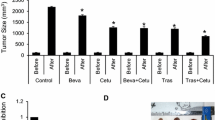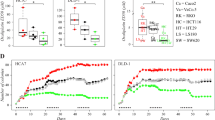Abstract
Purpose
Treatment effects of advanced gastric cancer (AGC) are unsatisfactory, and novel therapeutic approaches are much needed. The epidermal growth factor receptor (EGFR) monoclonal antibody cetuximab inhibits the growth of several human cancer cells but has been tested rarely for the treatment of GC. The synergy between cetuximab and irinotecan has been reported in colorectal cancer, but the mechanisms are still not fully clarified. Consequently, we hypothesized cetuximab/irinotecan combination should enhance the antitumor activity of irinotecan in GC cells.
Methods
The in vitro antiproliferative, pro-apoptotic, cell cycle arrest effects and induction of senescence were examined in SGC-7901 and MKN-45 GC cell lines. The effects of cetuximab or irinotecan as single agents or the combination on the expression of p53, p16, and EGFR signaling pathways were also studied.
Results
The study revealed that cetuximab alone did not show any antiproliferative, pro-apoptotic, cell cycle arrest or cellular senescence effect on GC cells but when combined with irinotecan synergistically inhibits GC cell proliferation and induces apoptosis and G2/M phase arrest. Irinotecan increases phosphorylation of EGFR, MAPK, and AKT and decreases the expression of P27Kip1, which could be all abrogated by its combination with cetuximab. The combination could also inhibit the expression of Cyclin D1 and phosphorylated mTOR while had no impact on p53, p16, PTEN, and HIF-1alpha.
Conclusions
Cetuximab enhances the activities of irinotecan on GC cells via the downregulation of the EGFR pathway upregulated by irinotecan. Combination therapy with cetuximab and irinotecan, a novel therapeutic approach, warrants further study in GC.





Similar content being viewed by others
References
Parkin DM, Bray F, Ferlay J, Pisani P (2005) Global cancer statistics, 2002. CA Cancer J Clin 55:74–108
Rivera F, Vega-Villegas ME, Lopez-Brea MF (2007) Chemotherapy of advanced gastric cancer. Cancer Treat Rev 33:315–324
Ciardiello F, Tortora G (2008) EGFR antagonists in cancer treatment. N Engl J Med 358:1160–1174
Cunningham D, Humblet Y, Siena S, Khayat D, Bleiberg H, Santoro A, Bets D, Mueser M, Harstrick A, Verslype C, Chau I, Van Cutsem E (2004) Cetuximab monotherapy and cetuximab plus irinotecan in irinotecan-refractory metastatic colorectal cancer. N Engl J Med 351:337–345
LaBonte MJ, Manegold PC, Wilson PM, Fazzone W, Louie SG, Lenz HJ, Ladner RD (2009) The dual EGFR/HER-2 tyrosine kinase inhibitor lapatinib sensitizes colon and gastric cancer cells to the irinotecan active metabolite SN-38. Int J Cancer 125:2957–2969
Han SW, Oh DY, Im SA, Park SR, Lee KW, Song HS, Lee NS, Lee KH, Choi IS, Lee MH, Kim MA, Kim WH, Bang YJ, Kim TY (2009) Phase II study and biomarker analysis of cetuximab combined with modified FOLFOX6 in advanced gastric cancer. Br J Cancer 100:298–304
Pinto C, Di Fabio F, Barone C, Siena S, Falcone A, Cascinu S, Rojas Llimpe FL, Stella G, Schinzari G, Artale S, Mutri V, Giaquinta S, Giannetta L, Bardelli A, Martoni AA (2009) Phase II study of cetuximab in combination with cisplatin and docetaxel in patients with untreated advanced gastric or gastro-oesophageal junction adenocarcinoma (DOCETUX study). Br J Cancer 101:1261–1268
Pinto C, Di Fabio F, Siena S, Cascinu S, Rojas Llimpe FL, Ceccarelli C, Mutri V, Giannetta L, Giaquinta S, Funaioli C, Berardi R, Longobardi C, Piana E, Martoni AA (2007) Phase II study of cetuximab in combination with FOLFIRI in patients with untreated advanced gastric or gastroesophageal junction adenocarcinoma (FOLCETUX study). Ann Oncol 18:510–517
Osaki M, Kase S, Adachi K, Takeda A, Hashimoto K, Ito H (2004) Inhibition of the PI3 K-Akt signaling pathway enhances the sensitivity of Fas-mediated apoptosis in human gastric carcinoma cell line, MKN-45. J Cancer Res Clin Oncol 130:8–14
Koizumi F, Kanzawa F, Ueda Y, Koh Y, Tsukiyama S, Taguchi F, Tamura T, Saijo N, Nishio K (2004) Synergistic interaction between the EGFR tyrosine kinase inhibitor gefitinib (“Iressa”) and the DNA topoisomerase I inhibitor CPT-11 (irinotecan) in human colorectal cancer cells. Int J Cancer 108:464–472
Horikawa Y, Otaka M, Komatsu K, Jin M, Odashima M, Wada I, Matsuhashi T, Ohba R, Oyake J, Hatakeyama N, Dubois RN, Watanabe S (2007) MEK activation suppresses CPT11-induced apoptosis in rat intestinal epithelial cells through a COX-2-dependent mechanism. Dig Dis Sci 52:2757–2765
Zhang J, Ji J, Yuan F, Ma T, Ye ZB, Yu YY, Liu BY, Zhu ZG (2009) EGFR-blockade by antibody Cetuximab inhibits the growth of human gastric cancer xenograft in nude mice and its possible mechanism. Zhonghua Zhong Liu Za Zhi 31:85–89
Lin CH, Fu ZM, Liu YL, Yang JL, Xu JF, Chen QS, Chen HM (1984) Investigation of SGC-7901 cell line established from human gastric carcinoma cells. Chin Med J (Engl) 97:831–834
Yokozaki H (2000) Molecular characteristics of eight gastric cancer cell lines established in Japan. Pathol Int 50:767–777
Karapetis CS, Khambata-Ford S, Jonker DJ, O’Callaghan CJ, Tu D, Tebbutt NC, Simes RJ, Chalchal H, Shapiro JD, Robitaille S, Price TJ, Shepherd L, Au HJ, Langer C, Moore MJ, Zalcberg JR (2008) K-ras mutations and benefit from cetuximab in advanced colorectal cancer. N Engl J Med 359:1757–1765
Kim MA, Lee HS, Lee HE, Jeon YK, Yang HK, Kim WH (2008) EGFR in gastric carcinomas: prognostic significance of protein overexpression and high gene copy number. Histopathology 52:738–746
Kim S, Prichard CN, Younes MN, Yazici YD, Jasser SA, Bekele BN, Myers JN (2006) Cetuximab and irinotecan interact synergistically to inhibit the growth of orthotopic anaplastic thyroid carcinoma xenografts in nude mice. Clin Cancer Res 12:600–607
Balin-Gauthier D, Delord JP, Rochaix P, Mallard V, Thomas F, Hennebelle I, Bugat R, Canal P, Allal C (2006) In vivo and in vitro antitumor activity of oxaliplatin in combination with cetuximab in human colorectal tumor cell lines expressing different level of EGFR. Cancer Chemother Pharmacol 57:709–718
Huang SM, Harari PM (2000) Modulation of radiation response after epidermal growth factor receptor blockade in squamous cell carcinomas: inhibition of damage repair, cell cycle kinetics, and tumor angiogenesis. Clin Cancer Res 6:2166–2174
Balin-Gauthier D, Delord JP, Pillaire MJ, Rochaix P, Hoffman JS, Bugat R, Cazaux C, Canal P, Allal BC (2008) Cetuximab potentiates oxaliplatin cytotoxic effect through a defect in NER and DNA replication initiation. Br J Cancer 98:120–128
Erlichman C, Boerner SA, Hallgren CG, Spieker R, Wang XY, James CD, Scheffer GL, Maliepaard M, Ross DD, Bible KC, Kaufmann SH (2001) The HER tyrosine kinase inhibitor CI1033 enhances cytotoxicity of 7-ethyl-10-hydroxycamptothecin and topotecan by inhibiting breast cancer resistance protein-mediated drug efflux. Cancer Res 61:739–748
Nakamura Y, Oka M, Soda H, Shiozawa K, Yoshikawa M, Itoh A, Ikegami Y, Tsurutani J, Nakatomi K, Kitazaki T, Doi S, Yoshida H, Kohno S (2005) Gefitinib (“Iressa”, ZD1839), an epidermal growth factor receptor tyrosine kinase inhibitor, reverses breast cancer resistance protein/ABCG2-mediated drug resistance. Cancer Res 65:1541–1546
Campisi J (2005) Aging, tumor suppression and cancer: high wire-act!. Mech Ageing Dev 126:51–58
Han Z, Wei W, Dunaway S, Darnowski JW, Calabresi P, Sedivy J, Hendrickson EA, Balan KV, Pantazis P, Wyche JH (2002) Role of p21 in apoptosis and senescence of human colon cancer cells treated with camptothecin. J Biol Chem 277:17154–17160
Hotta K, Tabata M, Kiura K, Kozuki T, Hisamoto A, Katayama H, Takigawa N, Fujimoto N, Fujiwara K, Ueoka H, Tanimoto M (2007) Gefitinib induces premature senescence in non-small cell lung cancer cells with or without EGFR gene mutation. Oncol Rep 17:313–317
Kishida O, Miyazaki Y, Murayama Y, Ogasa M, Miyazaki T, Yamamoto T, Watabe K, Tsutsui S, Kiyohara T, Shimomura I, Shinomura Y (2005) Gefitinib (“Iressa”, ZD1839) inhibits SN38-triggered EGF signals and IL-8 production in gastric cancer cells. Cancer Chemother Pharmacol 55:393–403
Keniry M, Parsons R (2008) The role of PTEN signaling perturbations in cancer and in targeted therapy. Oncogene 27:5477–5485
Kiyota A, Shintani S, Mihara M, Nakahara Y, Ueyama Y, Matsumura T, Tachikawa T, Wong DT (2002) Anti-epidermal growth factor receptor monoclonal antibody 225 upregulates p27(KIP1) and p15(INK4B) and induces G1 arrest in oral squamous carcinoma cell lines. Oncology 63:92–98
Huether A, Hopfner M, Baradari V, Schuppan D, Scherubl H (2005) EGFR blockade by cetuximab alone or as combination therapy for growth control of hepatocellular cancer. Biochem Pharmacol 70:1568–1578
Grimmler M, Wang Y, Mund T, Cilensek Z, Keidel EM, Waddell MB, Jakel H, Kullmann M, Kriwacki RW, Hengst L (2007) Cdk-inhibitory activity and stability of p27Kip1 are directly regulated by oncogenic tyrosine kinases. Cell 128:269–280
Kim JK, Diehl JA (2009) Nuclear cyclin D1: an oncogenic driver in human cancer. J Cell Physiol 220:292–296
Sarbassov DD, Guertin DA, Ali SM, Sabatini DM (2005) Phosphorylation and regulation of Akt/PKB by the rictor-mTOR complex. Science 307:1098–1101
Luwor RB, Lu Y, Li X, Mendelsohn J, Fan Z (2005) The antiepidermal growth factor receptor monoclonal antibody cetuximab/C225 reduces hypoxia-inducible factor-1 alpha, leading to transcriptional inhibition of vascular endothelial growth factor expression. Oncogene 24:4433–4441
Li X, Lu Y, Liang K, Pan T, Mendelsohn J, Fan Z (2008) Requirement of hypoxia-inducible factor-1alpha down-regulation in mediating the antitumor activity of the anti-epidermal growth factor receptor monoclonal antibody cetuximab. Mol Cancer Ther 7:1207–1217
Acknowledgments
We thank Xiangjin Liu, M.D. for her assistance in the medical writing of this article.
Conflict of interest
The authors declare that they have no conflict of interest.
Author information
Authors and Affiliations
Corresponding author
Rights and permissions
About this article
Cite this article
Liu, X., Guo, WJ., Zhang, XW. et al. Cetuximab enhances the activities of irinotecan on gastric cancer cell lines through downregulating the EGFR pathway upregulated by irinotecan. Cancer Chemother Pharmacol 68, 871–878 (2011). https://doi.org/10.1007/s00280-011-1559-2
Received:
Accepted:
Published:
Issue Date:
DOI: https://doi.org/10.1007/s00280-011-1559-2




